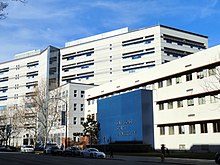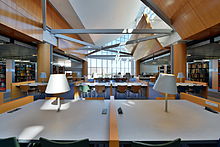Dr. Martin Luther King, Jr. Library
The library building can accommodate over 2000 visitors.
Building


The lower level (below floor 1) provides public computers, magazines and government documents. The reference collections are on floor 2. The volumes of the City Library system are shelved on floor 3. There, the non-fiction are indexed via the Dewey Decimal Classification and the fiction are sorted alphabetically by author's last name. The volumes of the University Library (known also as the Research Collection) are shelved on floors 6 to 8 and are indexed via the Library of Congress Classification System. Some duplicate volumes exist in both systems.
The center of the building is known as the Koret Atrium. On floor 1, in the atrium, a large LED display shows in real time the number of item loans (books and other media such as CDs and DVDs) that the entire City Library System has made since 2000. As of May 2016, that display showed a figure of over 177 million.
The lower level, second and third floors are where the majority of the public computers are located.
The fourth floor is dedicated to students with their laptops, and the lower floors provide large round tables for people to meet at. All floors except floor 1 provide individual alcoves for students or members of the public who are engaged in research for their studies. Floors 6 and 8 are "quiet study floors" and floor 7 is a "silent study floor".
Public art
Throughout the library are artworks by Mel Chin; the title of the series is Recolecciones (Spanish for "recollections").
On May 5, 2003 San Jose State's board of regents voted to name the plaza in front of the library the Robert L. Caret Plaza, after former university president Robert Caret.
Library

Special collections
Special collections within the library include, all on the 5th floor, the Ira F. Brilliant Center for Beethoven Studies, the Martha Heasley Cox Center for Steinbeck Studies, a California History Room, and the SJSU Special Collections & Archives. There is also the Dr. Martin Luther King Jr. Civil Rights Collection on the 3rd floor.
Computing and printing services
The library provides public computers and an online reservation system to reserve time on them. Students can also reserve study rooms through a similar online system. The computers are configured with Traditional Chinese input methods and input methods for some European languages. Some public computers are configured to access the library card catalog and other services only.
In the Koret Atrium on floor 1, there is a kiosk of eight public computers with Internet access for which a library card is not required. These are configured so that use is limited to 15 minutes at a time.

The lower level has about 20 public computers, and floors 2 and 3 about 50 public computers each. Login to these computers requires a San Jose city library card number and PIN. Access time is nominally limited to 2 hours per day per library card, but at the end of the session, if less than 90% of the public computers are busy, the user is granted another hour of session time; such extensions can continue as long as the library remains open. Login sessions of public computer users are automatically terminated when the library closes to the public.
All floors are equipped with Wi-Fi service. The public, unencrypted SSID is "King_Library_WIFI".
Cash-only print release stations and printers are available on floor 1 and other floors. Some print stations can be operated with print cards. Cash-only copiers are available on most floors.
Student life
The library is a major nexus point for student life at SJSU. Students often arrive with their laptops and engage in study groups both at tables and in study rooms.
During designated portions of the school year, after the library is closed for the day to the public, it remains open for "extended study hours" (24 hours) to SJSU students, staff and faculty.
-
The Robert L. Caret Plaza, in front of the southeast entrance
-
Main street-side (northwest) entrance
See also
References
- ^ "Dr. Martin Luther King Jr. Library". Emporis.com. Archived from the original on February 23, 2007. Retrieved 2008-08-05.
- ^ Rosen, Carol (September 4, 2013). "San Jose's Martin Luther King Jr. Public Library celebrates its 10th anniversary". San Jose Mercury News. Retrieved May 1, 2016.
- ^ Peterson, Christina A. (2005). "Space Designed for Lifelong Learning: The Dr. Martin Luther King Jr. Joint-Use Library". Library as Place: Rethinking Roles, Rethinking Space. Reports. 129. Council on Library and Information Resources. ISBN 1-932326-13-8.
- ^ "Recolecciones: The King Library Public Art Collections". Dr. Martin Luther King Jr. Library. Retrieved July 4, 2016.
- ^ "Art of Mel Chin". Dr. Martin Luther King Jr. Library. Retrieved July 4, 2016.
- ^ "Resolution to Name the Area Adjacent to the new Dr. Martin Luther King, Jr., Library the Robert L. Caret Plaza" (PDF). May 5, 2003.
- ^ "Computers @ King Library". Archived from the original on June 2, 2016. Retrieved May 17, 2016.
- ^ "Printing". Archived from the original on May 13, 2016. Retrieved May 10, 2016.
- ^ "Library Hours". Retrieved May 8, 2016.
External links
- Dual homepage
- SJSU homepage for the Dr. Martin Luther King, Jr. Library - includes library catalog and other resources
- San José Public Library Catalog
- SJSU Catalog
Further reading
- Birch, Eugénie L.; Stover, Jonathon. Martin Luther King, Jr. Library, San José, California (PDF). Livingston Case Studies in Urban Development. Philadelphia: Penn Institute for Urban Research, Pennsylvania State University.


